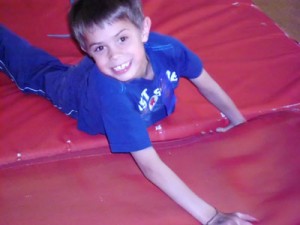As early as age 1, I knew that my third child would be different than my other 2. Sure, we all know that kids are unique, each one with a different personality. But, never had I expected the challenge that came with my third child. I write this trepadaciously, for those who have never had a child with extremely difficult behavioral issues will not understand this post. On the other hand, those who do or who have already raised a difficult child may find themselves reaching for a tissue as they relate to experiences and help that I'm hoping to share. Keep in mind, that while some of my words may help any mother of any child, I'm not talking about the child with occassional "normal" outbursts or moments of defiance or temper tantrums. These are more often the kids who routinely have severe tantrums, are extremely defiant and seem to have frequent, often unexplainable outbursts.
As a toddler, Ryan was full of life, running constantly, jumping off of anything he could climb (which was just about anything), and rarely stopping for a break. He was "all boy", as those who knew him would say. But, at home, life was different. With all of that energy came a lot of anger, frustration, and intense temper tantrums. It seemed he could be upset by the smallest thing, but the screaming, kicking and throwing things lasted for 2-3 hours. As a mother, I didn't know what to do. The biggest hugs, the consoling, the talking softly, even the consequences that all worked so well for my other children only made things worse for Ryan. The more I tried to help, the stronger the screams and kicks became. I'd lock myself into my room, cover my ears with my pillow, let the tears fall, and beg God for help in raising this precious boy.
Where had I gone wrong? Why was I failing? How come I couldn't raise him? My thoughts seemed to strangle me as I struggled to understand what went wrong. Day after day, I'd wake up determined to be the best Mom for Ryan. Day after day, I'd hit the pillow at night, exhausted, worn out, and even more convinced than the day before that I wasn't the Mom for him. Surely someone else could love him more. Someone else could understand him. Someone else could help him feel peace and overcome his anger.
It sounds depressing, I know, but I also believe that there are so many moms out there that feel the same way. When you're dealing with an especially difficult child, you are tried beyond what seem to be your personal limits. You read book after book on parenting skills, you go to specialists and therapists. Sometimes you get answers and sometimes you get another parenting tip. Sometimes it's helpful; sometimes it's not. Meanwhile, you watch your friends with their kids. They ask their child to come to the car and they come. You ask your child to come and he immediately runs to the farthest part of the park where you can't reach them. You watch them get hugs and kisses. You get kicks and screams. The whole time you feel like they're watching you, judging you. You want to crawl under a rock. And you wonder, what am I doing wrong?
Ryan is now 7. I wish I could say that he grew out of it. Deep in my heart, I wished he would. But, instead I learned some lessons that have drastically changed both Ryan's and my life. I hope to share them with you so that if you are just starting off on this journey, you can find hope and solace.
Lesson #1: My child is not intentionally trying to hurt me and frustrate me. Ryan seemed to know my buttons. The more he knew I hated something, the more he'd do it. I felt like he was "out to get me". But, after reading several books and coming to understand children with these types of personalities, I came to realize that that is not the case at all. He loves me. He needs me. His outbursts are not against me, but rather an expression of his frustration and emotions.
Lesson #2: My child has a difficult time expressing his emotions. DUH! That seemed so obvious. But, what I failed to see in the past was that it was difficult for HIM. It's not like he wanted to kick and scream, but when he got frustrated, he didn't seem to know any other way to deal with the emotions welling up in him. My job as his mom was to see past that and help him learn new ways to handle frustration.
Lesson #3: Consequences don't work while my child is in the "zone" of frustration, tantrum, etc. Keep in mind we're talking about this particular personality type and not the typical child. This was totally foreign to me. If my other kids acted up in the same manner, they were given a consequence (time-out, etc.) It worked. But, with Ryan, it backfired. He'd only get worse. The problem is that once he's in the "zone", he will only escalate if not left alone. He needs space and time to get back out of the zone. Later, Ryan was always receptive to talking about the problem.
Lesson #4: Take the time to teach when your child is not in the "zone". Ryan and I had a great talk one day. I explained to him that I was his coach. I believed in him. I knew he had incredible potential and I knew that he could be all that he wanted to be. I compared myself to his basketball coach and asked him how his coach helps him get better at basketball. He explained that he shows him how to dribble, has him practice and gives him pointers. I told him that I would be his coach with his emotions. I would teach him tricks on how to handle frustration. Then, we'd practice it. If there were places or times when he didn't handle it right, I would help him see how to improve and try again. He agreed to let me be his coach.
So, I started. Calmly, while sitting in his bed, we talked about how he feels when he gets frustrated (a "squeeze" in his chest, mad, etc.). Then, we talked about how he reacts to this feeling (kicking and screaming). I shared with him that while those were his natural response, they were not acceptable responses. Next, we BOTH brainstormed new responses that could replace the old. Ryan brought up "get a candy", "play a game", "play with magnets". I listened and added them to the list. I brought up, "go to your room and relax", "take deep breaths", "Say, that makes me frustrated and talk about the problem". Together we talked about EACH option. In the end, we decided to try "play with magnets", a pasttime that seemed to help him focus on something else. For a few weeks it worked well, when he'd get mad, he'd come and get the magnets and go quietly to his room until he felt better. But, a few weeks later, their effect wore off. We went back to our list and tried "talk about it" instead of "kick and scream". It didn't work. Why? I never helped him learn how to talk about it. Another coaching moment. Hopefully you get the gist. I realized I needed to teach and coach every step of the way. Unlike my other kids who seemed to be able to understand quickly how to change behavior to get what they wanted, Ryan needed step by step guidance and help. Take the time to be a coach.
Lesson #5: Avoid meltdowns over things that don't matter. This was so hard for me. There were things that to me really mattered: A clean room, matching outfits, things done when I asked, etc. But, I learned to ask myself, "Is this so important that I'm willing to endure a breakdown over it?" If the answer was yes (as in safety and when he was abusive to his siblings, etc.), then I would follow through with a consequence, knowing a tantrum would follow. But, if the answer was "no" (which it was in 90% of the cases), then I would let it go. If his outfit didn't match when he came down in the morning, oh well. If he cleaned his room, but fell short of my expectations, I praised him on what he did do. If he didn't do things when asked, I asked him when he could do them. He'd often say, "in 5 minutes". Sounds good to me. Meltdowns became less frequent. And though I was scared that that meant he'd get everything he'd want, I found that in reality, his behavior and obedience greatly improved.
Lesson #6: Learn to love your child again. I know that seems like a shocking statement, but a very real one if the struggles have lasted for years with no improvement. Your child is an incredible child. As is often the case with children with this type of behavior, they are often very intelligent and immensely creative. They have incredible skills and talents. Unfortunately, with all the negative behavior, it gets hard, even as a mom to see all the positive. Start a list of all the good you see in your child. It will help you see the positive and have a dramatic effect on how you see your child. In return, it will become easier to help him. Remember, he's not out to make your life difficult. He's simply struggling and needs extra help.
Lesson #7: It's not my fault. Wow! This was big. I didn't make Ryan the way he is. It wasn't my fault. Sure, I made mistakes and am not a perfect mother, but it wasn't my fault. He needs me to help him. I'm doing my best. I'm a great mom and I can do this. So can you. It's not your fault.
Lesson #8: Don't expect miracles. Oh, how depressing, but true. We'd try something new and for a few days, I'd be elated that finally, we had found the cure! But, a couple weeks later, the tantrums and anger would come back. I'd be so deeply frustrated. I got sick of even having the hope of change. Now, I realize that it's a long process. I teach and coach and Ryan learns at his own pace. When he succeeds we praise. When he has fallback, we refocus and try again. You'd never give up and get angry with a child that keeps falling while learning to walk. It's the same thing with Ryan. I just have to stop each time he falls, pick him up, encourage him and try, try again. And believe me, you will try, try again, hundreds of times. Just keep going! Ironically, when things do seem to get worse again, I go back to this list of lessons learned and can usually find a lesson that's falling short. I revamp my efforts in that area, and things improve again. Sometimes I'm the slow learner 🙂
Lesson #9: Sometimes the best cure is a hug. That may be specific to Ryan, but sometimes when he's exceptionally frustrated and dealing with it extremely poorly, I'll just say, "Ryan, I can see this is very difficult. I love you. I believe in you. Can I give you a hug?" Sometimes, he lets me. Other times, he refuses, but comes back a few minutes later and asks for one. His hug is usually rough and forced. But, I try to make mine tender and forgiving. It has great power in helping him overcome his emotions.
Lesson #10: Take time out for you. Often, when Ryan has pushed me past where I can go, I will say, "Ryan, I'm having a hard time controlling my emotions. I need to be left alone so I can deal with my frustration." I'll then go to my room and do what I need to do to relax. Teach him that you need to be allowed to do it during an "off-zone" time. If you need to leave for a walk, do it. If you need to go exercise and leave your husband at home, do it. If you're too exhausted to deal with the tantrums and outbursts, you'll be ineffective anyway. Don't be afraid to leave the outburst to give you time to control yourself.
Most of all, know that you can do it. There will be bumps in the roads, cries in prayer, and yearning for an easier road. But, there will also be joys, successes and the overwhelming sense that as you are helping this child to become all they can be. The miracle is that when it's all said and done, you'll realize that with all the tests they are putting you through, they are helping you become all that you can be, too.
Here are a few resources, among many that have helped me: The Total Transformation Program by James Lehman and The Explosive Child: A New Approach for Understanding and Parenting Easily Frustrated, "Chronically Inflexible" Children by Ross Greene







Thanks so much for this post. I have one of these children and sometimes I feel very alone so thanks for the post and the ideas.
This hit the spot for me. I could relate to every one of those feelings. And I do have tears in my eyes! I still struggle with feeling alone in my situation, judged on my parenting, failing etc but I do have a great support system as well. Loved the \All boy\ comments. But I too know all to well the at home struggles and non stop energy and tantrums that last for hours. Its hard not to get mad. Its hard to try to explain to some one that time out doesn’t work for my child when in that moment in public it looks as though I have no control over my child and I’m not even trying. I’m just so tired much of the time. It makes me want to not go out in public and just hide in my house. But then I would go crazy probably. My son is 5 and his vocabulary is that of a three year old and so we are just starting to actually communicate and somewhat understand what I am saying. I get so overwhelmed with joy when he can talk to me about his feelings. I still think he doesn’t understand much of the time but we are getting into the routine of talking about ways to react to situations. I just feel so helpless when he is so upset and he can’t stop moving and I can’t comfort him at all. It hurts to see defiant behavior, then outbursts that cannot be controled at the moment and having to let him be. Thank you for your post. It was a great reminder of things that have already been told to me but I need to read and hear more of these things daily.
Great info. Many good points. I like the modeling in giving yourself permission to say “I’m having a hard time controlling my emotions” and having a time out, just like you hope he will learn to do. And like you say, it takes time, no quick fixes.